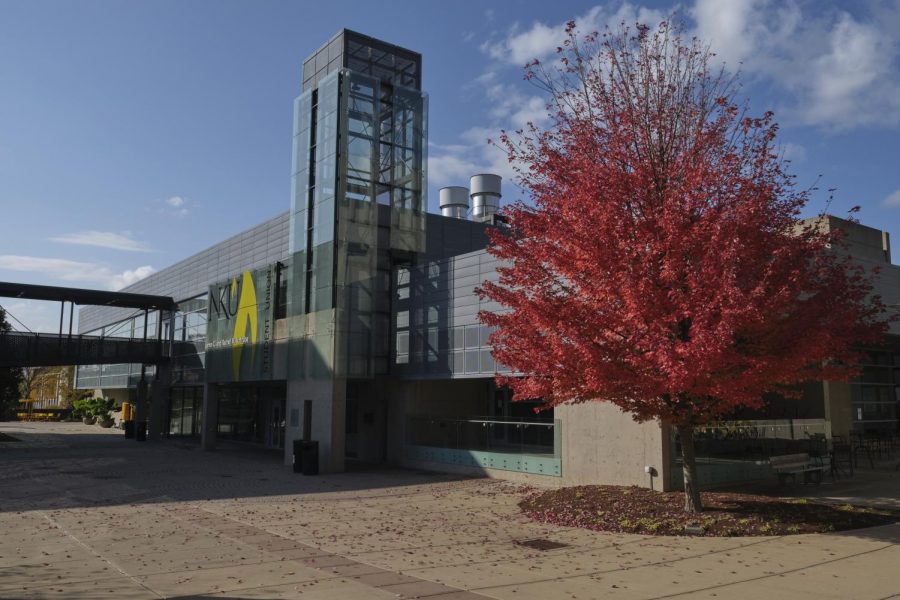COVID Vaccine Phase 1C delayed while administrators plan how to vaccinate campus, move forward
February 18, 2021
On Feb. 2, NKU announced that the state of Kentucky delayed Phase 1C of the COVID-19 Vaccine deployment from the current schedule and NKU administrators were prepared for the call.
The delay was due to a vaccine supply shortage, Robin Feltner, public health impacts administrator for the Northern Kentucky Health Department, said.
“This shortage is not from the local level or from the state level – vaccine is allocated on a federal level,” Feltner said over email.
Governor Andy Beshear has stated that Kentucky has the capacity to vaccinate 250,000 Kentuckians per week, yet they only receive 57,000 doses per week for the entire state.
Beshear has made it the priority of Phases 1A and 1B to get the 70 years and older population vaccinated. Phase 1C was to begin on Feb. 1; however, there are only 35% of the 70 years and older population vaccinated thus far due to supply shortage—which, to Dr. Valerie Hardcastle, wasn’t a surprise.
“From my perspective, it’s not at all surprising that they’re still trying to get through phase 1B. I think it was overly optimistic that they would be able to start anything phase 1C,” Hardcastle, director of NKU’s Health Innovation, said.
Hardcastle said that the delay is not a reflection of the state but rather a reflection of the federal level. At the state-level, Hardcastle believes Kentucky is doing eighth-best in the nation at getting the vaccines to the delivery centers and into the arms of those needing the vaccine.
According to Hardcastle, Kentucky’s success is because who can get the vaccine at during each phase. She cited states like New York and California that are having trouble getting the vaccine to the patient effectively.
Government communication during this period has also been beneficial to NKU, according to Hardcastle. The state has been as good as one can expect, Hardcastle said.
“Unfortunately, he doesn’t have a lot to communicate because all you could do is say, ‘well, we’re waiting for the supply,’” Hardcastle said.
Hardcastle believes this delay is mostly due to the nation trying to rapidly vaccinate everyone.
The university ordered the vaccines roughly a month ago. When the vaccines arrive on campus, Hardcastle said, they are ready to start administering.
“We’ve got the site identified. We’ve got an online signup system. We’ve got all the permission forms. We’ve got the protocol. We’ve got our categories about who should go first and so forth … so, we’re ready to go,” Hardcastle said.
“We just need the vaccine.”
The University is cleared to administer the Pfizer, Moderna and the Johnson and Johnson vaccines when they arrive. Hardcastle just doesn’t know which is coming to the University.
Feltner said the Health Department anticipates more vaccines to arrive weekly to the area, along with some partners throughout Northern Kentucky, which includes St. Elizabeth, HealthPoint Family Care and Kroger.
St. Elizabeth is important to the NKU community. Hardcastle revealed there is a contingency plan that involves NKU students getting vaccinated at St. Elizabeth should they receive vaccines before NKU does at the beginning of phase 1C.
“St. Elizabeth will set up a community site on NKU’s campus to vaccinate everyone in the community. If that’s the case, then we will partner with them on how to get NKU’s people scheduled in there, while they’re doing the whole community,” Hardcastle said.
Hardcastle said that a lot of students fall into Phase 4 of the vaccine plan, the University will have to see how that plays out on administering the vaccine at that capacity However, Hardcastle said that it is NKU’s intention to administer the vaccine to students regardless of their placement in the priority list should there be leftover vaccines.
As of right now, Feltner anticipates Phase 1C will start at the end of February.
“But, again, with a vaccine shortage, there is no way to project this date,” Feltner said.
NKU Moving Forward
Interim Provost Dr. Ande Durojaiye transitioned from the vice provost position to interim provost at the beginning of January and is looking for ways to coordinate the efforts across campus against COVID. He said the University is still planning for the future of campus not knowing what the vaccine would look like, along with contingency plans.
In the process, Durojaiye said that there has been a lot of transparency provided to NKU from the state government regarding the vaccine and breakdown of information.
“I’m encouraged about the communication. We’ve been in places where we felt like we were in the dark about things that were happening, and don’t feel that way right now,” Durojaiye said.
Durojaiye said at the Faculty Senate meeting in February that he doesn’t want to go back to normal. Rather, he wants to plan what a new normal will look like. One example of this is in the way the University conducts academic advising and class offerings.
“So [we’re] trying to find that right balance and not saying hey we’re going to throw the baby out with the bathwater, we’re just going back there and saying, ‘Wait a minute, what are some things that we did do that out of this pandemic we’re positive that we can hold on and help us better serve our students?’” Durojaiye said.

